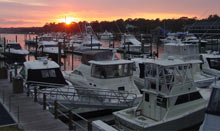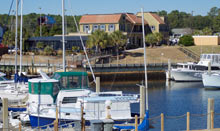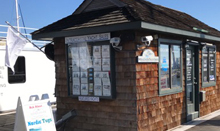If you’re looking to buy a boat, have you considered using a yacht broker? Using the services of a broker could save you time, anguish and even money.
Take Ed Shaughnessy, an engineering professor at Duke University, who was a relatively new boater with a 23-foot cuddy cabin, single engine boat. He was looking to move up to a 45-foot trawler. Searching online, he found a potential one that was listed with IntraCoastal Yacht Sales, in Little River, South Carolina. He also found Doug Ford, a principal with the brokerage as well as a Certified Professional Yacht Broker (CPYB).
The CPYB program originated with the Yacht Brokers Association of America (YBAA) and six other brokerage organizations nationwide. To qualify, a broker must have been in business three years, pass a lengthy exam, commit to and adhere to a strict code of ethics, and a continuing education program.
Yacht brokers don’t undertake the certification process just for themselves. The ultimate beneficiary is the person buying or selling a boat, no matter what size. It should give that individual a sense of confidence that the broker has made a significant commitment to being accountable to not only his peers but to the boating public.
With the budget Shaughnessy set, he knew “it had to be an older boat but then I ran the risk of getting a boat that needed so much work that it wouldn’t be a bargain.” He needed someone to “guide and advise me.”
Ford explains, “A broker can help the client to wade through the differences in boats – what features, engine differences, etc. Brokers help people who may not know what they want or what they are looking at.”
As an engineering professor, “I can be extremely picky, honing in solely on the systems,” admits Shaughnessy. “Doug assured me enough so I did not let my concerns overshadow the bigger picture and kill the deal. He always had insight on what was troubling me and on choices.” In fact, there was another trawler in Coquina Harbor that caught Shaughnessy’s eye. Doug’s knowledge of the different boats enabled him to “tell me that I didn’t need to look at that boat.”
With Ford’s assistance, Shaughnessy’s first large boat turned out to be a 47’ Marine trawler. “I was hoping if I bought this, I wouldn’t want a larger boat any time soon.” But, he “was struggling to learn how to maneuver the boat.” He also found out that because he was a relatively new boater, the insurance company required him to have training. Luckily, he discovered that Ford is a training captain. “He wasn’t just a good broker, he was an excellent trainer.”
Brokers tend to get categorized by the boats they sell such as sailboats or powerboats, sport fishing boats, etc. Ford’s category is more motor yachts and trawlers. “I don’t know why it’s that way,” he shrugs, “it just is.” Ford’s sales “generally range from $50,000 to $300,000.” The most expensive listing he currently has if $620,000 and he has made a sale that was over $1 million.
“Using a brokerage, your dollar value goes further,” Ford commented. “It’s a lot like real estate where the buyer has a good relationship with the agent; in boating, the buyer trusts his broker.”
Shaughnessy agreed, “Subsequent to my purchase, Doug sold my boat then my brother’s. In my family, he is definitely the only broker to use.” He continued, “You feel like you’re working with a friend. Doug was constantly guiding and advising me. The sense of trust that developed, to me, is really remarkable.”
Experienced yachtsmen also use brokers. Claiborne Young, who runs the Cruiser’s Net, had been out of the boat market for seven years. When he decided he needed a boat, he realized, “Although I’m in the cruising world all the time, it is a different world from the boat buying world. I knew I needed a broker to wade through the thousands of listings.”
He chose Doug Ford because he wanted a broker who would look out for his interests. “I cannot sing Doug’s praises enough!” Young once let a partner put in an offer for him on a boat he hadn’t seen. When he finally did see it, he knew it wasn’t for him. “Doug was able to completely smooth everything over.” And, Young just signed a contract for a DeFever 40, with Ford brokering the deal.
Young recommends using a broker because he or she will have all the forms and paperwork plus know what to do with them. He also advises “to choose a broker who is at least as interested in being your advocate as he is in selling you a boat.” When you find someone like Ford, the experience is “invaluable.”
Ford has been in the new boat business but prefers brokerage. “As a dealer, you are forced to focus on inventory; as a broker, I have no fixed set of goods and can concentrate more on my customers’ needs over a wider range of boats.” The two sides don’t really compete but that isn’t to say there is no working relationship between dealers and brokers. “Trade-ins at dealerships are usually available for co-brokerage,” explains Ford. “I do a fair amount of business, for instance, with Coastal Carolina Yacht Sales, co-brokering their used boats.” (Coastal Carolina is a dealer for Tiara Yachts, Pursuit Boats, Jupiter Boats, Back Cove Yachts and Sabre Yachts in Charleston and Hilton Head, as well as Wrightsville Beach, North Carolina.)
“I also think brokerage clients are more discriminating in that if they come to me to shop for a boat, I can be pretty sure they have the funds available. I have not had to deal with any bad credit situations.”
Ford says that is not the case at boat shows. “The last show I did, I brought a 44-footer from Myrtle Beach, wrote a contract and received a large deposit. I left the boat in Charleston after the show, then discovered the buyer had IRS problems, outstanding liens, etc. I spent over a $1000 on fuel and dockage. That has never happened to me with a brokerage client.”
IntraCoastal Yacht Sales receives most of its business through referrals and repeat customers. Shaughnessy thinks he knows why. “Doug is very good at selling. In the real estate business, you talk about people who can close the deal. Doug does that while always calm, always cheerful. He certainly made the deal work whether it was my concerns or those of the seller. It turned out to be a very good purchase for us and, since we live in Southport, I hope to continue the relationship with Doug as friends.”
Now that’s a happy customer!






